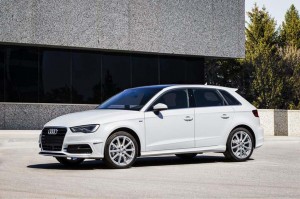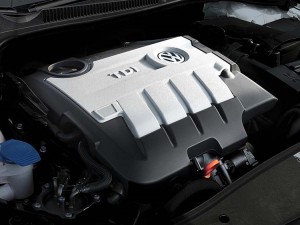
About 11 million vehicles sold worldwide used the software cheat. Fixing those sold in the U.S. is likely to be the most difficult part.
(This story updates an early report on TheDetroitBureau.com)
Volkswagen’s promise to deliver a fix for its rigged diesel engine “in the next few days” refers to vehicles sold in Europe and other foreign markets, not the U.S., according to a company source.
The “retrofit” that VW expects will bring the vehicles into compliance with government pollution standards was announced Tuesday in Berlin by the company’s new CEO, Matthias Mueller, who said customers would be contacted “in the next few days” with details.
But a company source, who spoke on condition of anonymity with TheDetroitBureau.com later in the day, said the promise only refers to VW diesels sold in Europe and some other foreign markets, not the U.S., where the fix will be more complicated.
The source said the retrofit in the U.S. is likely to require separate solutions for three different versions of the WA 189 diesel engine sold over the seven years since it was introduced, and may also require hardware changes in addition to altering the software.
As a result of that complexity, company officials are still working with the EPA, and announcement of a solution for U.S. VW owners remains some time off, the source said.
The automaker did not release any details on the retrofit, which will deactivate a “defeat device” — software that the U.S. Environmental Protection Agency found was secretly added to the ve`hicles to detect when they were undergoing emissions testing. The software would activate all emissions control systems during the testing, then switch many of them off when it was concluded, allowing the vehicles to produce up to 40 times the legal limit of dangerous smog-causing nitrogen oxides.
Experts said the retrofit will almost certainly involve replacing the software code that enabled the cheating.
But they said that VW also may have to modify most of the 4-cylinder diesel engines in the 482,000 cars sold in the U.S. to add a urea injection system. That is a more-advanced approach to reducing nitrogen oxides than the emissions-control system that was originally used on the vehicles, a choice driven by Volkswagen’s interest in holding down costs.
(New VW CEO Mueller faces long list of major problems. Click Here for the latest.)
The retrofit comes as VW faces potential EPA fines of more than $18 billion in the U.S., as well as a criminal investigation. It also is the subject of numerous investigations and potential fines abroad.
Beyond the actual cost of repairing the rigged diesels – estimated by some analysts at $6.5 billion – the retrofit could exacerbate the automaker’s legal liability in the U.S., if it impacts performance, according to lawyers who have filed lawsuits against the company.
“None of my clients would own these cars. They wouldn’t have paid the premium,” said Florida lawyer Scott Schlesinger, referring to the higher cost of the vehicles attributable to their supposed environmental cleanliness and fuel efficiency. Schlesinger was one of the first attorneys to file a class action lawsuit against Volkswagen in the U.S.
Declines in either fuel economy and performance, or both, would potentially open up the automaker to claims that it fraudulently sold the vehicles and should be responsible for refunding the entire purchase price, said another attorney suing the company.
“If this fix forces the vehicles to perform less than at the time of purchase I can see a class (-action lawsuit),” said Ted Craig, chair of the class action defense team at Florida’s GrayRobinson legal firm.
Certification of an injured class of plaintiffs would help attorneys argue “for a complete refund and, obviously, that would be disastrous for VW,” he said. He acknowledged, however, that plaintiffs’ attorneys would have to overcome numerous legal hurdles to prevail on that issue.
Mark Gillies, a spokesman for Volkswagen of America, declined to comment on the company’s potential legal liabilities resulting from the scandal, saying, “We don’t comment on active lawsuits.”
One potential complication in determining Volkswagen’s liability is the difficulty in putting a specific monetary figure to a decline in performance.
In cases such as the General Motors ignition switch recall, plaintiffs suing the automaker for alleged negligence could identify case where the faulty part was linked to deaths and other clear losses in seeking damages.
But the calculation was more complicated in other auto-related litigation, such as when Korean carmakers Hyundai and Kia were found to have lied about fuel economy, overstating the mileage of some models by up to 6 miles per gallon. Ultimately, the automakers voluntarily offered to cover the estimated higher fuel costs owners faced and also paid fines and settled lawsuits filed by consumers.
VW faces a wide range of legal challenges that could add to its woes as it attempts to put the cheating scandal behind it. In addition to possible lawsuits abroad, it likely to be fined by U.S. regulators and could face additional financial punishments if the Justice Department finds it has a case.
Prosecutors could also decide to pursue charges against individual company officials.
No officials at GM or Toyota were prosecuted as a result of high-profile safety lapses, legal experts caution the situation here is different since Justice might conclude there was a criminal conspiracy to defraud the EPA as well as consumers.
German prosecutors, meanwhile, have turned the spotlight on former VW CEO Martin Winterkorn, who resigned last week.
(For more on the German investigation of former VWAG CEO Winterkorn, Click Here.)
While he said he was “responsible” for the scandal in his role as chief executive, Winterkorn denied actually knowing about the scam. Investigators clearly want to know if he’s telling the truth. VW itself has said it will pursue those who were involved in the deception and the company has already suspended a number of senior officials.
(Mike Brunker contributed to this report.)



The U.S. and Euro diesel emissions requirements are quite different. The U.S. has the most stringent diesel emissions in the world to promote the sale of impractical EVs and punish U.S. consumers for buying practical high mpg diesels used by the rest of the world for the past 100+ years. All of the diesel vehicles VW sells world wide meet the emissions requirements when they are operated as designed. Any new hardware would be to improve performance while still meeting emissions.
As far as lawsuits there are already several class action lawsuits filed in the U.S. and there will be tons more here and around the globe. This will be a gold mine for the lawyers.
Help I need a lawyer
I’ve noticed ads popping up on the site for lawyers prepping class action suits, and you can do a Google search, as well. Eventually, I’d expect to see most or all of them consolidated into one.
Paul A. Eisenstein
Publisher, TheDetroitBureau.com